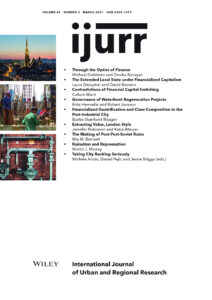This article examines how a restructuring local state repurposes existing government vehicles to navigate financial stress. Witnessing the changing use of intermunicipal companies (IMCs) by municipalities in Flanders (Belgium), we put empirical flesh on the bones of what we conceptualize as the extended local state. Our argument is that, while IMCs were set up to organize energy and water systems, several rounds of state restructuring have repurposed them into safety valves for municipal finance. As our analysis shows, austerity, devolution and budgetary control at the municipal level have been paralleled by an inflation of IMC debt, which, given the strategic importance and state ownership of IMCs, can be interpreted as off‐balance‐sheet local state debt. IMCs have also taken on new roles as vehicles for debt‐driven state investment and tax regulation workarounds. In effect, the local state is an active agent in installing practices of regulatory arbitrage and through IMCs it is connecting, albeit largely unwittingly and haphazardly, to financial market dynamics. While such exposures are limited compared to cases where financial markets alter municipal statecraft profoundly, when unchecked, these acts of institutional bricolage may eventually function as Trojan horses installing value extraction from public services in Flanders.
Details
Written by:
Laura Deruytter & David Bassens
Digital Object Identifier (DOI)
10.1111/1468-2427.12987
About DOI

